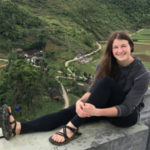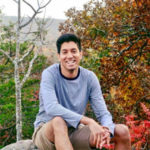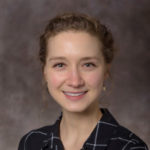“Nebraska Goes Global” selected as finalists in American Medical Association Global Health Challenge, led by UNMC ID EMET Student
UNMC medical students Olivia Sonderman, Laura Newton, and Rohan Khazanchi have been selected as finalists in a national competition for future healthcare professionals interested in global health equity. Their team, “Nebraska Goes Global”, was selected as one of 10 finalists in the American Medical Association’s (AMA) 2018 Global Health Challenge for their submission advocating for evidence-based medical volunteerism and global health work that addresses social determinants of health.
The AMA Global Health Challenge is a competition for undergraduates, medical students, and residents sponsored by Timmy Global Health, a non-profit organization with community health partnerships domestically and internationally in underserved areas. Finalists were selected based on initial essay submissions; winners will be chosen based on a combination of judging and voting on the essays and videos. Contest winners will have the opportunity to work alongside Timmy Global Health in Ecuador, Guatemala, or the Dominican Republic to help provide high-quality health services to local underserved populations.
The UNMC students, led by M2 Team Leader Rohan Khazanchi (UNMC ID EMET student interested in Infectious Diseases) wanted to share a bit about themselves as they ask for your vote.
What drew each of you to competing in this global health competition, and to a broader interest in working with underserved communities? How do you foresee these interests developing throughout your career?
 Olivia: During my studies at UNL, I became interested in underserved communities after volunteering at the People’s City Mission (PCM) free health clinic. While at PCM, I interacted with patients who fell through the cracks in our healthcare system, a system that I have always been able to access. Soon after, I began to recognize disparity in my hometown of Columbus, NE in patients living in rural areas who struggle to meet with urban specialists to manage their health problems. Furthermore, my major of Global Studies took me to Mumbai, India where I met patients diagnosed with epilepsy who faced a great deal of social stigma surrounding their disease.
Olivia: During my studies at UNL, I became interested in underserved communities after volunteering at the People’s City Mission (PCM) free health clinic. While at PCM, I interacted with patients who fell through the cracks in our healthcare system, a system that I have always been able to access. Soon after, I began to recognize disparity in my hometown of Columbus, NE in patients living in rural areas who struggle to meet with urban specialists to manage their health problems. Furthermore, my major of Global Studies took me to Mumbai, India where I met patients diagnosed with epilepsy who faced a great deal of social stigma surrounding their disease.
In each setting, I was fortunate to encounter people working to help these communities: healthcare professionals and staff who volunteered their time, urban doctors making efforts to travel to rural communities, and non-profit organizations that fought to reverse social stigmas and increase access to care. I quickly realized how important and rewarding their work was and decided to pursue medicine to join in their efforts. After I complete my third year of medical school, I will take a leave of absence to pursue a one-year Masters in Health Policy at a different institution. I hope this training will prepare me to both critically examine existing health policy and create novel legislation that improves the care our global medical community can provide to its patients. This global health competition specifically interested me as a way to better understand how to effectively serve a community with a well-respected organization like Timmy Global Health.
 Rohan: My interest in health disparities largely stems from the time I spent as an undergraduate in St. Louis. Following the shooting of Michael Brown in Ferguson, a neighborhood 10-15 minutes from where I lived at the time, I became acutely aware that St. Louis, like Omaha, is a city with historically ingrained divisions that create disparities in the social determinants of its citizens’ health. I was inspired by the widespread activism I saw around St. Louis and involved myself in a narrative-based music outreach program to help uplift the stories of young community members. I was also motivated to leverage my own leadership positions on campus to advocate for the mental health of students of color and LGBTQ+ students.
Rohan: My interest in health disparities largely stems from the time I spent as an undergraduate in St. Louis. Following the shooting of Michael Brown in Ferguson, a neighborhood 10-15 minutes from where I lived at the time, I became acutely aware that St. Louis, like Omaha, is a city with historically ingrained divisions that create disparities in the social determinants of its citizens’ health. I was inspired by the widespread activism I saw around St. Louis and involved myself in a narrative-based music outreach program to help uplift the stories of young community members. I was also motivated to leverage my own leadership positions on campus to advocate for the mental health of students of color and LGBTQ+ students.
I spent time with a team of students and physicians working with a rural community in Honduras, through which I learned about the scope of global health disparities by hearing the stories of local patients and providers. By the end of college, I was inspired by the compassionate work of my peers and mentors and decided to apply to medical school to continue caring and advocating for underserved communities as a physician. These goals drew me to the HIV Enhanced Medical Education Track (EMET), through which I am working on a project characterizing the social, demographic, and clinical factors impacting changes in the outcomes of people living with HIV. Like Olivia and Laura, I was drawn to this competition to continue exploring these interests with Timmy Global Health, an organization that has well-established local partnerships and values high-quality, evidence-based care on a global scale.
 Laura: Through volunteering at community organizations growing up, I became aware of differences in wealth, educational opportunities, and neighborhood resources between Omaha communities. During a college course in Ecuador which focused on social and political transformations, I gained a broader understanding of the global pervasiveness of inequalities, especially in health. In Minnesota where I attended college, I volunteered at a community health clinic teaching an exercise and nutrition class for Hispanic and Somali women struggling with obesity and diabetes. The hard work, persistence, and camaraderie of these women left me inspired and grateful for their friendship and the privilege to take part in their path to better health, and I felt drawn to a vocation in health care.
Laura: Through volunteering at community organizations growing up, I became aware of differences in wealth, educational opportunities, and neighborhood resources between Omaha communities. During a college course in Ecuador which focused on social and political transformations, I gained a broader understanding of the global pervasiveness of inequalities, especially in health. In Minnesota where I attended college, I volunteered at a community health clinic teaching an exercise and nutrition class for Hispanic and Somali women struggling with obesity and diabetes. The hard work, persistence, and camaraderie of these women left me inspired and grateful for their friendship and the privilege to take part in their path to better health, and I felt drawn to a vocation in health care.
In medical school, I travelled twice with a group of UNMC students and faculty to Falmouth, Jamaica to provide medical care to that community and the surrounding villages. I was again struck by the injustice of inequities in health and access to medical care both between countries and within communities. I participate in UNMC’s Enhanced Medical Education Track for Underserved Health Care, which immerses students in community partnerships and prepares us to be leaders in advocacy for the unique health care needs of these populations, both inside and outside clinic walls. This global health competition appealed to me as an opportunity to explore with my fellow students the challenges of global health and witness firsthand how an organization such as Timmy Global Health provides high quality service to underserved populations.
Click this link to watch their video, read more about their mission to combat health disparities throughout their careers, and vote for their team DAILY until July 30th!
Content and photos provided courtesy Olivia Sonderman, Laura Newton, and Rohan Khazanchi
